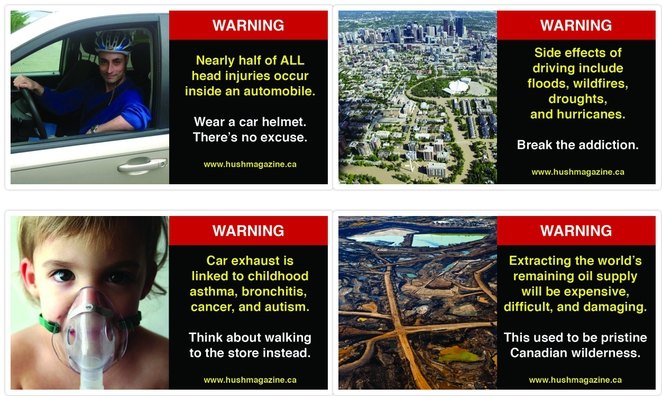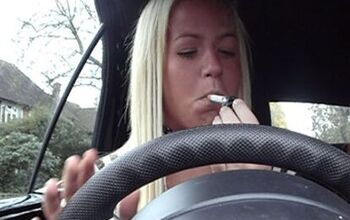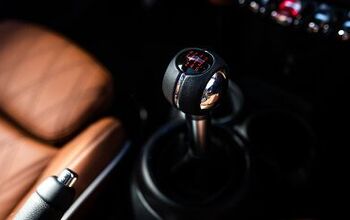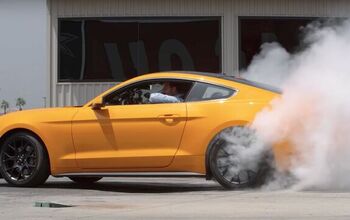Is Driving the New Smoking?
copyright Chris Bruntlett
I love to smoke. That’s not a cool thing to admit; in fact it’s socially irresponsible. But there is something very satisfying about lighting up, and the sensation of that first drag. For me it’s not about nicotine. No I enjoy the act of smoking. Fortunately I also love to run and the two habits are rarely complementary. Save the occasional relapse, I quit some 16 years ago. But if smokes were only as bad for me as coffee, I would still light up, social pressures be dammed.
Apparently it’s a personal inclination. The automobile as evil is not new, but Chris Bruntlett wants to start a social trend that equates driving with smoking. He wants a communal backlash and public shaming of drivers. I am not upset because he hates cars; I am upset because I can almost agree with him.
In a recent submission to Vancouver magazine Hush, self-professed bike-geek Bruntlett calls driving “selfish, anti-social, unhealthy, and destructive.”
“Let’s face it: when someone gets into a car, they are entering a bubble. Not just a physical bubble of metal and glass, but also a figurative one, where all logic and reasoning is barred from entering…”
Apparently, we have shared the same morning commute.
“…They seem oblivious to the simple truth that the motor vehicle is the most inefficient mode of transportation ever devised. Without thinking, they squander millions of years of stored solar energy to haul around two tons of metal, fiberglass, machinery, and electronics, along with their meager frame. This machine demands a colossal amount of space: 300 square feet when parked, and 3,000 square feet when moving at 50 km/hr. As a result, we carelessly hand over vast chunks of our public realm to the parasitic automobile; space that could be put to much better use.”
The hybrid owners reading this can remove your smug expression now. It’s not just the pollution; it’s driving. According the Bruntlett, your green car is just as evil as my El Camino.
I am not entirely convinced the automobile is less efficient than say, an F-4 Phantom, but my old 1978 Mercury Colony park wagon came pretty close. Much has been opined about the swelling mass of even the most frugal of automobiles. I agree we could put that space to better use. Freeways are like your mother-in-law; they’re getting wider and uglier.
Jay Leno noted that alternative transportation will save the automobile in the same ilk the automobile saved the horse. Horses are now kept for sporting and pleasure. As a result, the quality of life for most horses is infinitely superior to the pedestrian mare of the old west. As better ways of moving people about arise, the car will become less of a need and more about leisure and entertainment. I’m surprisingly comfortable with that.
No worries, I won’t be scuttling my fleet anytime soon, and it’s not Chris Bruntlett’s logic winning me over. The shock numbers of his “warning label” for example;
copyright Chris Bruntlett
“Perhaps no other symptom of car culture is more prevalent – and ignored – than the daily carnage that takes place on our streets. Every single day on this planet, 3,561 people suffer a horrific death inside a car. If another consumer product – such as a toaster – was causing this amount of death and destruction, we would immediately fix or ban the toaster. Instead, we treat road deaths as inevitable, collateral damage in our modern lives.”
He sneaks “3,561” in right after “planet.” Quick Georgia public-school math tells me that this is just under 1.3 million annually. Despite the World Health Organization listing Road Injury as the 9th leading cause of death, that figure could multiply 10 times the current rate and still not equate to 2% of the global population. I am not being flippant about 1.3 million, but diarrhea-related diseases claimed 1.9 million in the same period, one could argue about the horrific nature of that death as well our ability to prevent it.
I don’t dislike Chris Bruntlett, in fact I respect him. He is a man of passion, and puts his money where his mouth is, riding a bicycle in hilly and (in the winter) wet, Vancouver. I can’t agree with his total mindset, but I can see a version of his world;
“We need a massive public education campaign to remind folks how dangerous, expensive and inefficient cars really are. In doing so, we might finally break the cycle of car addiction, and we’ll all be a little healthier, wealthier and happier for it.”
The way I see it, that means a utopian vision of easy, affordable and reliable public transportation that will take me to work, social engagements and the Midwest safely, efficiently and with the same pleasure I get from hopping in my Land Rover and jetting hallway across the US. The air will be clean and the cities full of green areas for children to play. The costs of that network and its upkeep would be staggering, but if it keeps those promises I’m in.
But I won’t quit driving.
Because in that utopian world, those of us who insist of feeding our automotive addiction will become the smokers in your building, achieving solidarity through being outcasts. The fringe of society will huddle in forgotten corners of your neighborhood around an idling engine we maintain for our own pleasure and enjoyment. Mirroring the evolution of the picnic area behind your parking lot, vast stretches of highway will be re-purposed as designated “driving areas.” They will exist just for me and my smelly cohorts. The stench of gasoline will permeate our clothes, and the grease under our nails will stand out like nicotine stains. The masses of society will cast disapproving stares, and we’ll smile back.
No, the automobile as evil is not new, but neither is the automobile as rebellion.
W. Christian Mental Ward has owned over 70 cars and destroyed most of them. He is married to the most patient woman in the world; actually rides a bicycle and so far in 2013 has run over 630 miles.
School teacher, amateur racer, occasional story teller.
More by W Christian Mental Ward
Latest Car Reviews
Read moreLatest Product Reviews
Read moreRecent Comments
- Spectator Wild to me the US sent like $100B overseas for other peoples wars while we clammer over .1% of that money being used to promote EVs in our country.
- Spectator got a pic of that 27 inch screen? That sounds massive!
- MaintenanceCosts "And with ANY car, always budget for maintenance."The question is whether you have to budget a thousand bucks (or euro) a year, or a quarter of your income.
- FreedMike The NASCAR race was a dandy. That finish…
- EBFlex It’s ironic that the typical low IQ big government simps are all over this yet we’re completely silent when oil companies took massive losses during Covid. Funny how that’s fine but profits aren’t. These people have no idea how business works.



































Comments
Join the conversation
Cars are only inefficient if time has no value to you. If it does, the car is pretty nice. Not everyone can afford to live and work near public transport.
I can't imagine the even higher cost of urban living if we didn't have as many cars. As more urban real estate becomes even more desirable, due to limiting cars/roads etc, I'd rather just make a car payment and maintenance.